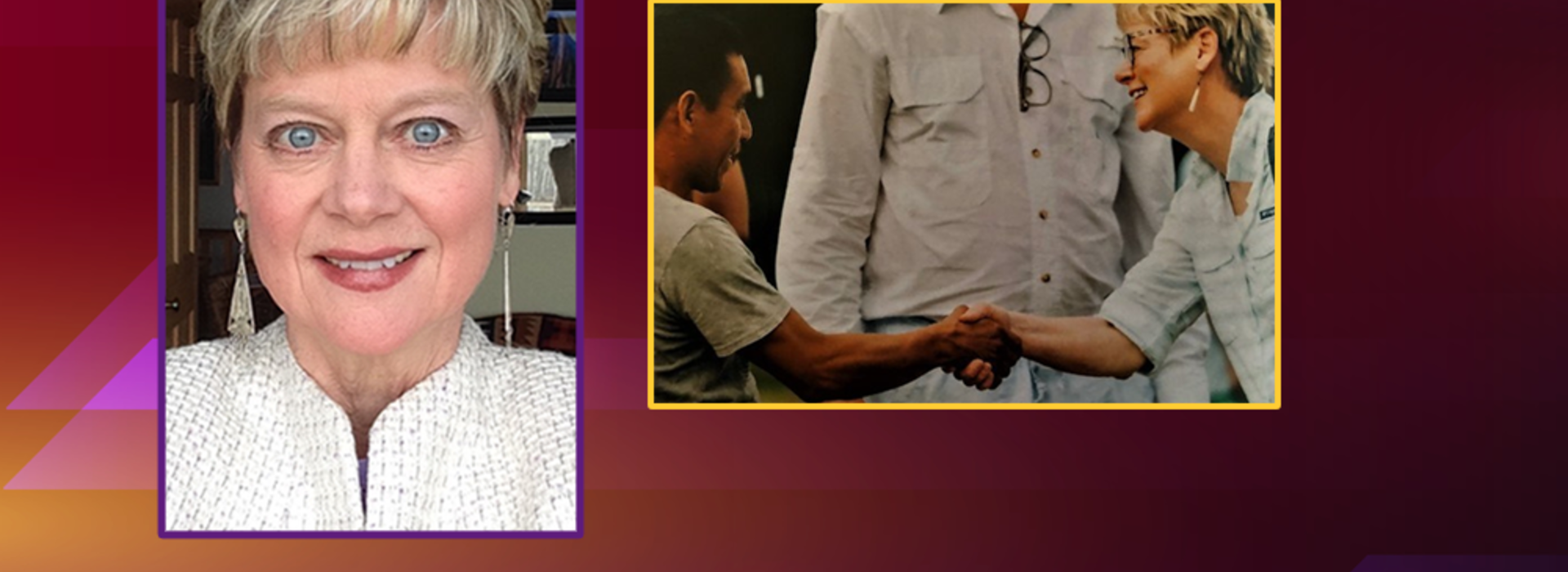
Training Tribal Leaders in the Amazon: A Journey by Dr. Kathy Halverson
Dr. Kathy Halverson developed a culturally appropriate interactive approach to disease prevention and community health development in the Amazonian lowlands. The Duluth Campus alumna is a Medical School Alumni Board member, among other volunteer opportunities, and fondly recalls her educational journey.
Twelve years ago, in the Amazon lowlands of Peru, Dr. Kathy Halverson ('86) joined nationals and tribal leaders seeking to improve their communities' well-being. "I came first with my black bag," she said. "But it was apparent that everyone would soon be sick again from preventable disease. I became an educator, but it produced little change in community illness. These preliterate people were storytellers, conversationalists, oral-based learners, not didactic. So, building relationships, having conversations with these leaders, and learning from successful and experienced NGOs, I developed a culturally appropriate interactive approach to disease prevention and community health development."
According to Dr. Halverson, the main goal was improvement in local health with the use of local resources. "The method is equipping local leadership," she said. "With the tools included initiating community dialogues and teaching in their language, culture, and people groups."
During this experience, Dr. Halverson noted that the health prevention tools were translatable and transferrable for other communities. "At Renew Health, we train trainers, resulting in more sustainable, improved community health. We now have trainers who have traveled to Brazil, Mozambique, Columbia, Papua New Guinea and the Dominican Republic. During COVID, we provided zoom sessions with community leaders in Malawi, Zambia, and most recently - Gambia."
Before her experiences in South America, Dr. Halverson practiced full spectrum Family Medicine for fourteen years. "During that time, in the early 1980s, I was also active in helping establish the First Witness Child Advocacy Center, providing the medical component in this multidisciplinary, collaborative, child-friendly approach to investigating and responding to child maltreatment. It was early on establishing national standards of care and understanding normative findings in child sexual abuse. Mid-career, I received a Bush Medical Fellowship. I studied Adolescent Health Care, hoping to help standardize the clinical visit to address issues that profoundly affect adolescents and their ongoing well-being as adults."
Although her professional journey embraced a vast horizon, Dr. Halverson takes note of the anchor that made many things possible. "It has always been about relationships, and what I have most enjoyed about practicing medicine are the relationships," she said. "In my current work, I am thankful that despite different languages, cultures, and lifestyles – it's hot in the jungle! I have long-standing friendships with some very remarkable people. I am glad to come alongside them in their important work. To learn, to always keep learning."
As a Medical School Duluth Campus graduate, Dr. Halverson recalls other relationships that have contributed to professional joy and satisfaction. "I found the first two years of medical school incredibly challenging," she said. "I had much catching up to do with a non-science undergraduate degree. I consider it a privilege to have had so many fine classmates and to have experienced the support and encouragement of the professors and staff at the Duluth campus."
Among her many memories about the northern school, Dr. Halverson fondly remembers that while the academics were grueling and complex, once again, the relationships paved the way to life balance. "I had a brilliant, creative, fun-loving group of classmates. When Jean Regal was a newly hired pharmacology professor, some classmates surprised us in lecture with a raucous, carefully rehearsed, perfectly dressed complete with zoot suits and wild hair, beautifully crafted and painted cardboard cutout guitars. They led an air band concert to the song "I Want New Drugs." It was standing room only. Many of us went out dancing together to a rock and roll band on weekend nights to let off some steam, initiating group line dancing and the stroll. We shocked the band when they asked if we were a group of art and theater majors. We were not, and that was part of the fun."
Today, Dr. Halverson continues to train and strengthen efforts to share medical knowledge in remote, rural areas while supporting important programming at the medical school. As an alumni relations board member, she participates with the same zeal and joy that brought her to the Amazon years ago. "I believe that together, those of us who have been trained as physicians at the school of medicine can bring those qualities to bear on the world of medical practice for the better," she said. "We can share our knowledge in places including upcoming CME seminars and conferences currently being planned by the alumni relations board. We hope to address some of the systemic, cultural, relational, technological, and economic factors that hinder the care of patients by physicians who are themselves healthy and supported. Volunteering as a board member brings me into the core of what I am passionate about and what the Duluth Campus instilled in me during my education and still does through the years."